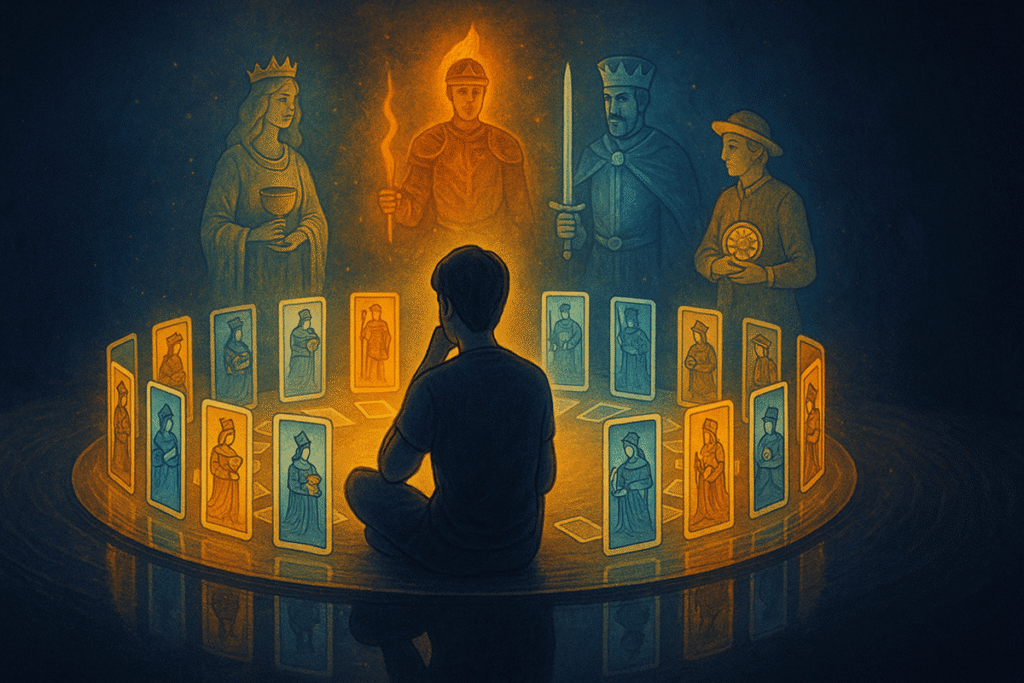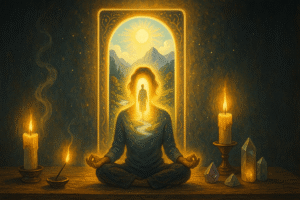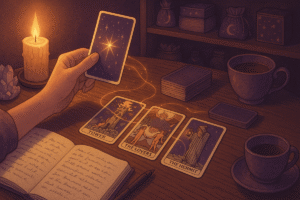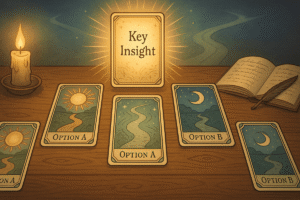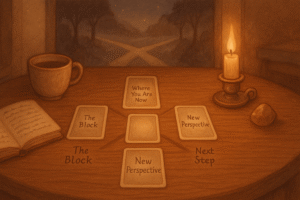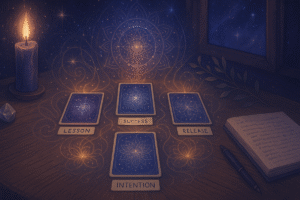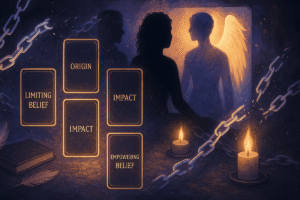Table of Contents
I’ll be honest. For years, I found the court cards utterly confusing. Pages, Knights, Queens, Kings—were they supposed to represent other people? Events? Stages of life? Every book seemed to offer a different interpretation, and none of it clicked until I stumbled upon a perspective that changed everything. What if these sixteen figures weren’t about external circumstances at all? What if they were mirrors reflecting different facets of my own personality?
This realization transformed my tarot practice completely. The court cards became less like mysterious strangers and more like an inner council, each one representing a distinct aspect of who I am and who I’m capable of being.
Meeting Your Inner Council
Think about yourself for a moment. Are you the same person when you’re comforting a friend as you are when you’re defending a boundary? Probably not. We contain multitudes, as the saying goes. Some days we lead with our analytical mind, other days with pure emotion. Sometimes we’re cautious, sometimes impulsive. The beauty of the court cards is that they give us a vocabulary for these shifting internal states.
The sixteen court cards span four suits (Cups, Wands, Swords, and Pentacles) and four ranks (Page, Knight, Queen, King). Each combination creates a unique psychological profile. The suit tells us which realm of life we’re working with: emotions, passion, thought, or material reality. The rank indicates how that energy expresses itself, from the exploratory curiosity of Pages to the mastery of Kings.
When you look at these cards as aspects of yourself rather than predictions about others, something shifts. They become less about fortune telling and more about self awareness.
The Four Suits as Internal Landscapes
Before we dive into individual cards, it helps to understand what each suit represents within your psyche.
Cups govern your emotional world. These are the parts of you that feel deeply, connect intimately, and navigate relationships through empathy. When you’re accessing your Cups energy, you’re tuned into subtle emotional currents, both in yourself and others. You might find yourself drawn to creative expression, seeking meaningful connection, or simply sitting with feelings without needing to fix them.
Wands embody your passion and drive. This is where your enthusiasm lives, along with your vision for what’s possible. Wands energy shows up when you’re inspired by a new project, when you’re taking initiative, or when you’re following your gut instinct about which direction to move. It’s the part of you that believes in your own potential and isn’t afraid to take up space.
Swords represent your thinking mind. These aspects of yourself analyze, communicate, and make decisions based on logic and clarity. Sword energy cuts through confusion and speaks truth, sometimes gently, sometimes not. When you’re in Swords mode, you’re probably problem solving, setting boundaries, or trying to see a situation objectively rather than through an emotional lens.
Pentacles connect to your physical reality and practical wisdom. This is the grounded part of you that builds, maintains, and tends to material concerns. Pentacles energy shows up when you’re managing resources, caring for your body, developing a skill through patient practice, or creating stability in your daily life.
The Four Ranks as Modes of Expression
The rank of each court card describes how that suit’s energy moves through you.
Pages are the explorers and students within you. When you embody a Page, you’re approaching something with fresh eyes, curiosity, and a willingness to be a beginner. Pages ask questions. They’re not trying to have all the answers yet. There’s something vulnerable but also freeing about Page energy. It’s the part of you that’s willing to look foolish in order to learn something new.
Knights are about movement and pursuit. These are the action oriented aspects of your personality. When you’re in Knight mode, you’re not just thinking or feeling, you’re doing. Knights have a goal and they’re moving toward it, though each suit’s Knight moves differently. Sometimes this energy serves you well; other times it can become unbalanced or excessive if you’re not careful.
Queens embody mature integration of their suit. These are the parts of you that have internalized wisdom and now express it naturally, almost effortlessly. Queen energy is receptive and nurturing but also deeply powerful. Queens don’t need to prove anything. They know who they are and they create an environment that reflects their values.
Kings represent external authority and structured expression of their suit. When you access your inner Kings, you’re not just feeling or being something, you’re actively governing that aspect of your life. Kings make decisions, set long term strategies, and take responsibility for outcomes. They’re the CEO of their particular domain.
What Court Card Am I Right Now?
Here’s where this framework becomes practical. Rather than asking “what court card am I” as a fixed personality assessment, try asking, “which aspect of myself am I currently expressing, and which might I need to call forward?”
You might be predominantly in Queen of Pentacles mode during a period when you’re focused on building financial security and creating a comfortable home. But perhaps a challenging conversation requires you to shift into King of Swords energy, where you can communicate clearly and hold a firm boundary. Maybe creative burnout means you need to reconnect with your Page of Wands, that playful beginner’s mind that doesn’t take everything so seriously.
I’ve found it useful to pull a court card in the morning and ask, “Which part of myself wants attention today?” Sometimes the card that appears is one I’ve been neglecting. Other times it’s confirming an energy I’m already feeling. Either way, it creates an intentional relationship with these different aspects of my personality.
Your Tarot Personality Through Court Cards
The concept of a “tarot personality” can be approached through court cards in a few ways. Some people resonate strongly with one or two court cards that feel like their default setting, their home base personality. Maybe you’re naturally a Knight of Wands type, always chasing the next adventure, or perhaps you identify with the Queen of Cups, leading with emotional intelligence.
But I think it’s more interesting, and perhaps more accurate, to recognize that your tarot personality is actually a constellation of all sixteen court cards in varying degrees. You have access to all of them, though some may feel more natural or developed than others.
Try this exercise. Go through each of the sixteen court cards and rate on a scale of one to five how easily you can access that energy. Be honest with yourself. Then look at which cards scored lowest. Those aren’t weaknesses necessarily, but they might represent aspects of yourself that are underdeveloped or that you’ve been taught to suppress. The King of Swords might feel foreign if you were raised to prioritize other people’s feelings over your own truth. The Knight of Cups might feel uncomfortable if you learned that expressing romantic or emotional enthusiasm was somehow embarrassing.
The cards you struggle with most often represent the edges of your growth.
Working With Individual Court Cards
Let me walk you through a few examples of how specific court cards might show up as aspects of yourself.
The Queen of Cups is your deeply intuitive, emotionally attuned self. When you need to access this part of yourself, you’re probably dealing with a situation that requires empathy, emotional wisdom, or creative inspiration. She’s the part of you that knows how someone is feeling before they say it, that can sit with difficult emotions without trying to fix them, that trusts gut feelings even when they don’t make logical sense.
The Knight of Swords, in contrast, is your direct, assertive, cutting through nonsense self. This is the aspect you might need when someone is being manipulative and you need to call it out clearly. Or when you’ve been overthinking something and you just need to make the decision already. The Knight of Swords part of you doesn’t mince words and isn’t overly concerned with whether everyone likes what you have to say. Sometimes that’s exactly what’s needed.
The Page of Pentacles represents your student self in practical matters. Maybe you’re learning a new skill, starting a business, or trying to understand your finances better. This part of you is willing to start small, to be methodical, to focus on the fundamentals even when they’re not glamorous. There’s a patience to the Page of Pentacles that other parts of you might lack.
The King of Wands is your visionary leader self. When you’re in this energy, you’re not just pursuing your own passion, you’re inspiring others and bringing them along. You’re making bold moves, taking calculated risks, and trusting in your ability to handle whatever comes. The King of Wands part of you doesn’t wait for permission.
Each court card offers something unique. The key is recognizing which aspect would be most helpful in any given situation.
Which Aspect of Myself Would Be Most Helpful Today?
This question has become central to my daily practice. Rather than approaching tarot as telling me what will happen, I use it to explore which part of myself I might want to consciously embody.
Some mornings I pull the Knight of Pentacles and realize I need to slow down and focus on steady progress rather than trying to do everything at once. Other days I get the Queen of Swords and recognize that I’ve been too accommodating, that I need to access my inner clarity and communicate more directly.
The practice isn’t about forcing yourself into a particular mode. It’s about awareness. Once you know which aspect might be helpful, you can make conscious choices about how you show up. You can ask yourself throughout the day, “What would the Queen of Wands do here?” or “How would the Page of Cups approach this situation?”
Perhaps the most valuable realization is that you’re not limited to one way of being. You contain the emotional depth of the Queens of Cups, the strategic thinking of the Kings of Swords, the adventurous spirit of the Knights of Wands, and the practical wisdom of the Kings of Pentacles. All of it. Every court card lives somewhere within you, available when you need it.
Creating Your Own Practice
If this approach resonates with you, I’d suggest starting simply. Get familiar with the sixteen court cards. Spend time with each one. Notice which ones you’re drawn to and which ones make you uncomfortable. That discomfort is information.
Then begin pulling a daily court card with the question, “Which aspect of myself wants my attention today?” or “Which part of me would be most helpful to embody today?” Journal about it if that feels right. Notice throughout the day when that energy shows up or when you wish you could access it but can’t quite get there.
Over time, you might find that certain court cards appear repeatedly when you’re facing particular types of challenges. That’s useful data about your patterns. You might also discover that deliberately working with a court card you typically avoid starts to shift something in how you show up in the world.
The sixteen court cards aren’t just illustrations on pieces of cardstock. They’re a map of human psychological complexity, a reminder that we’re all capable of thinking, feeling, acting, and being in multiple ways. Learning to work with them as aspects of yourself rather than external predictions opens up a practice that’s less about divination and more about self reflection and intentional growth.
And honestly, I find that far more interesting.
Frequently Asked Questions
Can I have more than one court card personality?
Absolutely. You’re not limited to a single court card identity. Most people find they naturally express multiple court cards depending on context and life circumstances. You might be a Queen of Pentacles at work, a Page of Cups in new relationships, and a Knight of Swords when defending boundaries. The goal isn’t to pin yourself down to one card, but to recognize which aspects you can access and which might need development.
What if I pull the same court card repeatedly in my daily practice?
When a particular court card keeps appearing, it’s usually highlighting an aspect of yourself that needs attention right now. This might be an energy you’re already embodying strongly, or conversely, one you’re avoiding or need to develop. Rather than worrying about repetition, get curious about what that specific court card is trying to teach you during this period of your life.
How do I work with court cards I find uncomfortable or don’t relate to?
The court cards you struggle with most often represent underdeveloped or suppressed aspects of yourself. If the Knight of Swords feels aggressive to you, you might have learned to avoid directness. If the Queen of Cups seems too vulnerable, you may have been taught to guard your emotions. Start small by consciously embodying that energy in low stakes situations, and notice what comes up for you. These uncomfortable cards often show you exactly where your growth edges are.
Does my main court card personality change over time?
Yes, your dominant court card can shift as you move through different life stages and circumstances. Someone who was primarily a Page in their twenties might develop into a Knight in their thirties as they pursue goals more actively, then mature into a Queen or King later. Major life changes like career shifts, relationships, or personal crises can also temporarily or permanently shift which court card aspect feels most natural to you.

